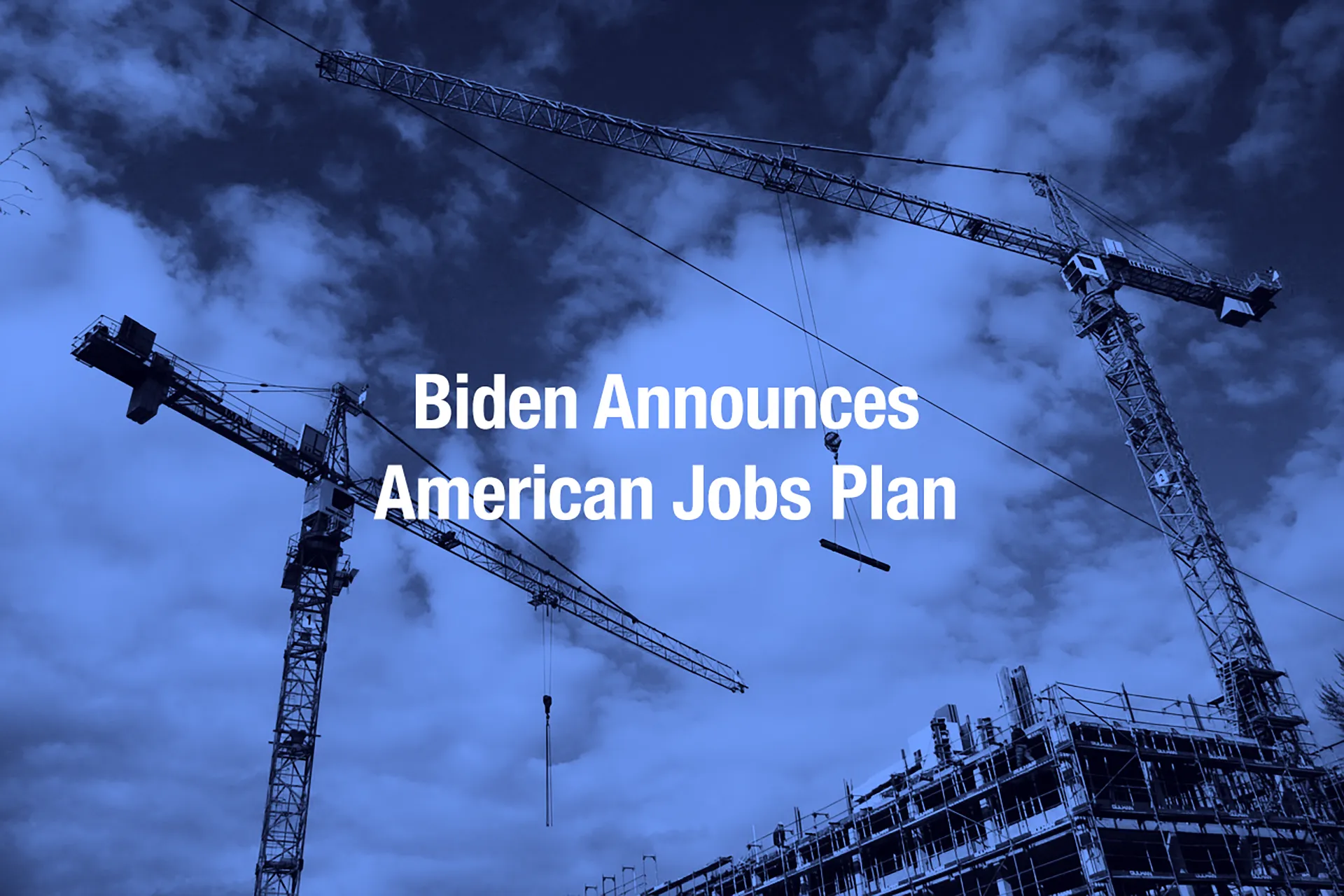Construction Technology Federal Contracts Loom Large in Biden’s Tenuous Infrastructure Plan
On March 31, 2021, President Biden announced the American Jobs Plan. The proposal includes a $2.25 trillion investment in public infrastructure. The Jobs Plan includes investment in manufacturing, workforce training, and healthcare services, while stimulating the economy and creating jobs. By investing heavily in research and development, particularly in clean energy technologies, this plan aims to spur innovation.
Proponents of the plan hope that it will help the economy recover from the pandemic and provide new opportunities for workers across the nation. Because of the plan’s focus on research, development, and infrastructure, its implementation will incentivize construction technology innovation as companies compete for government contracts.
Connected Construction Technologies
Many major construction projects are now made possible by innovative construction technology that increases productivity and sustainability while lowering costs. Known as connected construction, this construction technology makes use of tech that streamlines people, workflows, and project management.
McKinsey estimates if these technologies were more widely used by contractors, construction productivity would increase 14%-15%. And, construction costs would decrease by 4% to 6%. Moreover, McKinsey contends that this tech would help reduce carbon emissions by providing transparency in construction projects and accurately showing how they were completed. And, showing more accurately how they were completed from start to finish. Given the Biden administration’s focus on infrastructure related clean energy, efficiency, and cost-effectiveness, construction companies can use connected construction technologies to win federal construction contracts.
Moreover, construction lags behind other industries in terms of digitization, making infrastructure spending crucial. While the U.S. is lagging in construction investment, countries like China are already investing their ability in technology infrastructure. China has a $1.4 trillion technology infrastructure plan to build out its 5G, AI, and cloud computing systems. South Korea has also unveiled its own Green New Deal, focused on improving clean energy technologies. The U.S., meanwhile, has not enacted a major infrastructure bill since Eisenhower.
Connected Construction and Transportation Infrastructure
The Jobs Plan will invest $621 billion in modernizing roads, bridges, and highways. It also aims to build 500,000 electric vehicle charging stations nationally by 2030. Connected construction technology can help the country realize these ambitious goals by improving coordination and project management. This tech will also help contractors increase productivity and transparency. As such, the government can easily track how funds are being allocated and ensure efficiency while eliminating waste.
Road-paving machines, for example, could use innovative augmented reality technology and digital models to calculate where and how much asphalt should be poured. And, back end office engineering teams can do these calculations thousands of miles away. Innovative equipment like this proves even more valuable in the time of a pandemic, when the ability to manage projects remotely is crucial.
Construction Technology for Large-Scale Projects
The jobs plan includes a $418 billion investment in affordable housing, public schools, childcare facilities, and medical clinics. These projects rely on an information ecosystem that allows data to flow smoothly between everyone involved (like project managers and construction workers). This efficient data flow helps large scale construction projects increase productivity and transparency.
For example, an enterprise resource planning system (ERP) could track the construction of a new medical clinic. This tech provides real-time data to workers on the ground and engineers in the office. The ongoing connection to real-time data allows contractors to see if they are running over budget or behind schedule. Contractors can then course correct quickly, limiting the amount of rework necessary. That’s big news considering that rework often represents roughly 20% of construction projects’ budgets.
Moreover, one of the most important parts of maximizing the productivity of any construction project is ensuring that contractors, architects, and stakeholders are all on the same page. Project management software is the best way to do this. As John Meibers puts it, “The number one problem caused by not adopting new technology is poor communication.”
In particular, miscommunication between field and office workers leads to inefficient supply chain, disorganized logistics, and decreased productivity.
Construction technology is also increasingly being used to reduce existing carbon footprints and create new green infrastructure. As countries race toward carbon neutrality and even negativity, green infrastructure can help realize these goals.
Since the Biden administration values environmental sustainability, seen in the clean energy initiatives in the jobs plan, environmentally friendly contractors will secure a majority of government contracts.
With the increased interest in green infrastructure, scientists are working on global standards to objectively evaluate how environmentally friendly construction projects are. For example, researchers from Alta University are looking into the carbon flow in plants, mulches, and greenery. The results of this study could help construction companies reduce their carbon footprint with environmentally friendly landscaping.
Construction Technology and Data Security
Data security is an increasingly important priority for the government. Using up-to-date software can help contractors eliminate cyber security vulnerabilities.
Modern construction software can ensure data is backed up and stored in the cloud. Security measures like two-factor authentication can also protect sensitive data.
Contractors that have a tech-savvy workforce can ensure their employees follow cybersecurity best practices to protect sensitive data.
In conclusion, Biden's Jobs Plan has big implications for construction and PropTech. This plan can incentivize construction companies to modernize their technology to reduce their carbon footprint, boost productivity, and limit inefficiencies.

